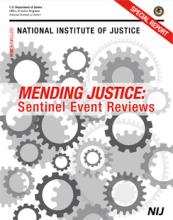Policy
Some Initial Findings and Policy Implications of the Pathways to Desistance Study
Impact of Research on Legal Policy: The Minneapolis Domestic Violence Experiment
The Convergence of Race, Ethnicity, Gender, and Class on Court Decisionmaking: Looking Toward the 21st Century
Terrorism, Risk, and Legislation
Sexual Violence Against Alaska Tribal Women: Village Public Safety Officers Having Some Impact
National Institute of Justice's Forensic Technology Center of Excellence 2019 National Opioid and Emerging Drug Threats Policy and Practice Forum
First Step Act Implementation Fiscal Year 2020 90-Day Report
Easily Overstated: Estimating the Relationship Between State Justice Policy Environments and Falling Rates of Youth Confinement
Firearm Legislation and Firearm Violence Across Space and Time: A Comprehensive Data Collection Effort
NIJ's Role Under the First Step Act
Measuring the Criminal Justice System Impacts of Marijuana Legalization and Decriminalization Using State Data
American Association for the Advancement of ScienceScience & Technology Policy Fellowships
Mending Justice - Sentinel Events in Criminal Justice
Illegal Immigration, Immigration Enforcement Policies, and American Citizens Victimization Risk
Enhancing Public Health and Public Safety: Informing Medication-Assisted Treatment Policies and Programs in the Criminal Justice System
Incarceration and Desistance: Evidence from a Natural Policy Experiment
Violence Against American Indian and Alaska Native Women and Men - 2010 Findings from the National Intimate Partner and Sexual Violence Survey
This seminar provides the first set of estimates from a national large-scale survey of violence against women and men who identified themselves as American Indian or Alaska Native using detailed behaviorally specific questions on psychological aggression, coercive control and entrapment, physical violence, stalking, and sexual violence. These results are expected to raise awareness and understanding of violence experienced by American Indian and Alaska Native people.
See the YouTube Terms of Service and Google Privacy Policy
White Collar Crime
The subprime mortgage industry collapse has led to a record number of foreclosures. In this environment, the interest mortgage fraud has risen, along with questions of how fraud contributed to the crisis. Henry Pontell and Sally Simpson discuss what they have learned about investigating and prosecuting white-collar criminals, the role of corporate ethics in America, and what policymakers and lawyers can learn from evidence of fraud.
See the YouTube Terms of Service and Google Privacy Policy
State Responses to Mass Incarceration
Researchers have devoted considerable attention to mass incarceration, specifically its magnitude, costs, and collateral consequences. In the face of economic constraints, strategies to reduce correctional populations while maintaining public safety are becoming a fiscal necessity. This panel will present strategies that states have undertaken to reduce incarceration rates while balancing taxpayer costs with ensuring public safety.
See the YouTube Terms of Service and Google Privacy Policy
Wrongful Convictions: The Latest Scientific Research & Implications for Law Enforcement
What does science tell us about case factors that can lead to a wrongful conviction? Dr. Jon Gould of American University will discuss the findings of the first large-scale empirical study that has identified ten statistically significant factors that distinguish a wrongful conviction from a "near miss." (A "near miss" is a case in which an innocent defendant was acquitted or had charges dismissed before trial). Following Dr. Gould's presentation, Mr. John R.
See the YouTube Terms of Service and Google Privacy Policy
The Neurobiology of Sexual Assault: Implications for Law Enforcement, Prosecution, and Victim Advocacy
Dr. Campbell brings together research on the neurobiology of trauma and the criminal justice response to sexual assault. She explains the underlying neurobiology of traumatic events, its emotional and physical manifestation, and how these processes can impact the investigation and prosecution of sexual assaults. Real-world, practical implications are examined for first responders, such as law enforcement, nurses, prosecutors, and advocates.
See the YouTube Terms of Service and Google Privacy Policy



